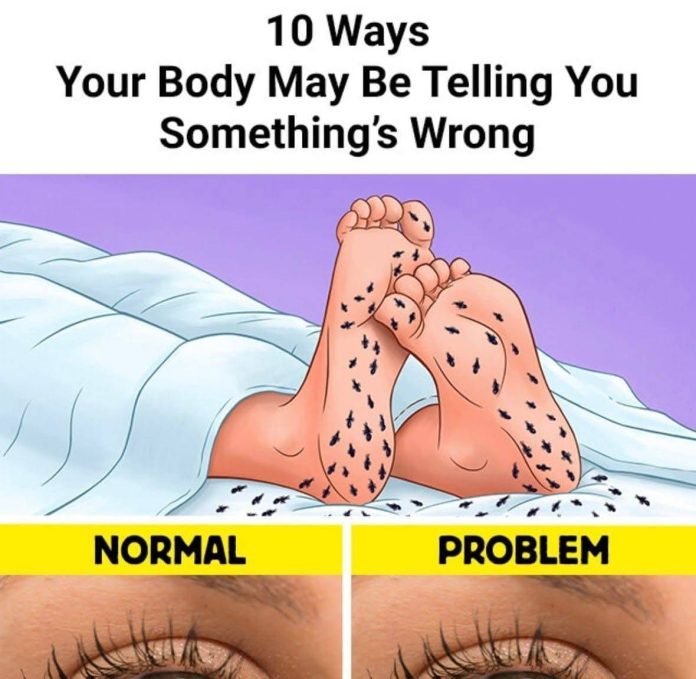Our bodies possess an intricate system of signals designed to alert us when something isn’t functioning optimally. While some signs are overt, such as pain or fever, others are more subtle and can easily be overlooked. Recognizing these understated cues is crucial for early detection and prevention of potential health issues. Here are ten subtle ways your body may be indicating that something is amiss:
1. Persistent Leg Discomfort
Experiencing a crawling or aching sensation in your legs, especially during periods of rest, could be indicative of Restless Leg Syndrome (RLS). This condition often manifests in the evening or nighttime, leading to an uncontrollable urge to move the legs. Symptoms may include sensations of creeping, pulling, throbbing, or itching. RLS can disrupt sleep, affecting overall quality of life. Consulting a healthcare professional can provide access to treatments such as medications or lifestyle modifications to alleviate symptoms.

2. Thickening Skin
Noticing that your skin is becoming thicker or developing a rough texture can be a sign of underlying health conditions. Chronic inflammatory diseases like Pityriasis Rubra Pilaris (PRP) or psoriasis can cause such changes. Additionally, hypothyroidism, a condition where the thyroid gland is underactive, may lead to skin thickening. If you observe these changes, it’s advisable to seek medical evaluation to determine the underlying cause and appropriate treatment.
3. Altered Handwriting or Sense of Smell
Subtle changes in handwriting, diminished sense of smell, or vivid dreams can be early indicators of Parkinson’s disease. This progressive neurological disorder often begins with mild symptoms that gradually worsen, including tremors, stiffness, and slowed movement. Early detection is vital for managing the disease effectively, so consulting a neurologist if you experience these changes is recommended.
4. Unexplained Anger or Irritability
Experiencing heightened anger or aggression over minor issues may be more than just moodiness; it can be a manifestation of underlying depression. Depression doesn’t always present as sadness; in some individuals, irritability and anger are predominant symptoms. If you notice a persistent change in your emotional responses, seeking support from a mental health professional can provide strategies to manage these feelings.
5. Excessive Sleepiness
Regularly sleeping more than the recommended seven to nine hours per night or feeling an overwhelming need to nap during the day could signal hypersomnia. This condition is characterized by excessive daytime sleepiness and can be associated with disorders such as sleep apnea, depression, or neurological diseases. A sleep specialist can conduct evaluations to identify the cause and recommend appropriate interventions.
6. Changes in Eye Appearance
The development of a gray or white ring around the cornea, known as arcus senilis, can be a normal part of aging. However, in younger individuals, it may indicate elevated cholesterol levels, increasing the risk for cardiovascular diseases. If you observe this change, it’s prudent to have your cholesterol levels checked and discuss potential lifestyle modifications or treatments with your healthcare provider.
7. Intense Salt Cravings
While occasional salt cravings are common, an insatiable desire for salty foods can be a sign of underlying health issues such as Addison’s disease, Bartter syndrome, or cystic fibrosis. These conditions affect hormone production and kidney function, leading to electrolyte imbalances. If you find yourself constantly craving salt, it’s important to consult a healthcare professional for evaluation.

8. Persistent Fatigue and Forgetfulness
Feeling consistently tired, experiencing memory lapses, and a decreased interest in intimacy can be symptoms of hypothyroidism. This condition results from insufficient thyroid hormone production, leading to a slowdown in various bodily functions. A simple blood test can diagnose hypothyroidism, and treatment typically involves hormone replacement therapy.
9. Unquenchable Thirst
Experiencing excessive thirst, known as polydipsia, along with dry mouth and frequent urination, can be indicative of high blood sugar levels associated with diabetes. It’s essential to monitor these symptoms and seek medical advice, as early detection of diabetes can prevent complications and facilitate effective management.
10. Craving Ice
A compulsive need to chew ice, known as pagophagia, is often linked to iron deficiency anemia. The exact connection is not well understood, but addressing the underlying iron deficiency through dietary changes or supplements can alleviate this craving. If you find yourself frequently chewing ice, consider consulting your healthcare provider for a blood test to check your iron levels.
Being attuned to these subtle signals allows for early intervention and better health outcomes. If you notice any of these signs persisting, it’s important to consult with a healthcare professional to determine the underlying cause and appropriate treatment.

















